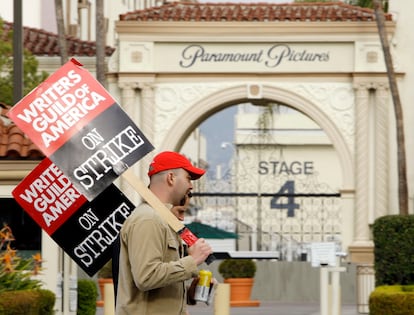Hollywood inches closer to a screenwriters’ strike
The Writers Guild of America overwhelmingly favors a May 1 work stoppage, adding pressure in its negotiations with major studios


Hollywood is approaching its first strike in 16 years. On April 18, the Writers Guild of America (WGA) turned up the heat on its negotiations with major studios when an overwhelming majority of the 11,500-member organization voted in favor of striking if a new collective bargaining agreement is not reached before the current one expires on May 1. The move adds pressure on studios to improve work conditions for a vital role in the storytelling industry.
Only 2% (9,218) of WGA members voted against a strike. In 2017, 96% of the WGA’s membership leaned in favor of striking, which was enough to push both sides to an agreement and avoid the first writers’ walkout since 2007, when the industry was rocked by a 14-week work stoppage. The 2007 strike hit Hollywood heavily and also affected California’s economy. A report by the Milken Institute estimated the strike cost the state’s economy $2.1 billion and 37,000 jobs lost.
Much has changed since then. Screenwriters have been speaking out for weeks. Charlie Kaufman, who wrote screenplays for Being John Malkovich and Eternal Sunshine of the Spotless Mind, slammed studios early last month when he picked up his WGA lifetime achievement award. “We are trained to believe that what we do is secondary to what they do,” said Kaufman, “… trained to do the bidding of people who are motivated not by curiosity but who are protecting their jobs.”
One of the main sticking points is about residuals, a royalty payment for performers and writers in a successful movie or TV show. The WGA negotiating committee argues that the current model no longer works in this digital age. Streaming platforms like Netflix only pay a set amount for the U.S. and another one for foreign markets. Screenwriters don’t earn any more if a production becomes a hit. However, broadcast television networks have a sliding scale. Digital platforms now account for 45% of the industry’s residuals.
Residuals are important to the WGA, which estimates that half its members write for TV series. The pandemic triggered a boom in content creation for a quarantined world, which also boosted residual income for screenwriters. Last year, the organization reported its “highest revenue in history” for 2021. This represents 48.2% growth in income between 2011 ($333 million) and 2021 ($494 million).
The income growth is mostly due to the number of new productions. A rerun of a one-hour program on the ABC broadcast television network pays a $24,500 residual to the writer. On Netflix, that same writer would only earn $20,000. Smaller digital platforms cap residual payments for a one-hour rerun at $13,346. The residual amount drops every year a show is in a video-on-demand company’s catalog.
Actress and writer Kyra Jones tweeted an example of the problem. “In case y’all are wondering why a WGA strike may be impending, my first residual check for the broadcast show I wrote on was $12,000. I just got my first residual check for my streaming show… $4,” wrote the screenwriter for Woke (Hulu) and Queens (ABC).
Studios claim platforms like Netflix, Hulu, Disney+ and HBOMax have increased opportunities for writers with their skyrocketing output. Traditional media outlets have a more elusive requirement to qualify for the extra residual payments: a series must have five seasons or 100 episodes to trigger residuals, which are only paid after the fifth year.
Shrinking pay
“Budgets for TV series have grown by 50% in the last decade, while the average pay for screenwriters has declined by 4%,” said Eric Haywood, a member of the WGA negotiating committee. Adjusted for inflation, this represents a 23% loss. The union says it’s also seeking to raise minimum pay scales for experienced screenwriters.
In 2013, 33% of TV show writers were at the lowest end of the pay scale. The WGA says 50% of its members are now in this range. Charles Slocum, assistant executive director at the WGA West, told Deadline, “You can’t have a showrunner working for the same rate as a story editor. If they are going to pay more experienced writers at the minimum scale, then there has to be a higher minimum for those writers,” Showrunners – the series creators – are the kings of television. Ryan Murphy (Monster: The Jeffrey Dahmer Story), Shonda Rhimes (Scandal, Grey’s Anatomy), and Robert and Michelle King (The Good Wife) are established names with success track records and exclusive contracts with streaming platforms. But many other screenwriters could benefit from a renegotiation in a transformed industry.
Sign up for our weekly newsletter to get more English-language news coverage from EL PAÍS USA Edition
Tu suscripción se está usando en otro dispositivo
¿Quieres añadir otro usuario a tu suscripción?
Si continúas leyendo en este dispositivo, no se podrá leer en el otro.
FlechaTu suscripción se está usando en otro dispositivo y solo puedes acceder a EL PAÍS desde un dispositivo a la vez.
Si quieres compartir tu cuenta, cambia tu suscripción a la modalidad Premium, así podrás añadir otro usuario. Cada uno accederá con su propia cuenta de email, lo que os permitirá personalizar vuestra experiencia en EL PAÍS.
¿Tienes una suscripción de empresa? Accede aquí para contratar más cuentas.
En el caso de no saber quién está usando tu cuenta, te recomendamos cambiar tu contraseña aquí.
Si decides continuar compartiendo tu cuenta, este mensaje se mostrará en tu dispositivo y en el de la otra persona que está usando tu cuenta de forma indefinida, afectando a tu experiencia de lectura. Puedes consultar aquí los términos y condiciones de la suscripción digital.








































